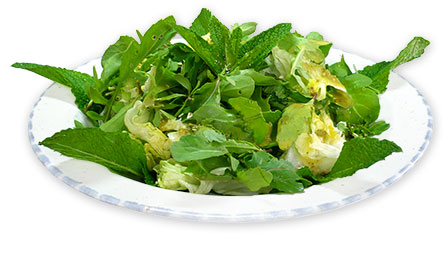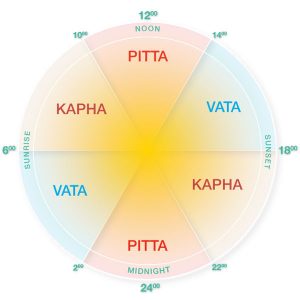“I’m feeling listless all the time,” – “I sleep well but I’m still tired,” – “I have some kind of pressure in my right upper abdomen.” This is how patients with a stressed liver may describe their condition.
Usually, the symptoms are so unspecific that the underlying problem is only detected at a very late stage, e.g. when people do a blood test or ultrasound at their physician’s office.
This is true in any case, whether the liver disease is caused by alcohol consumption, harmful medications, genetic factors, or by bacteria and viruses.
The liver is central to our metabolism and detoxification. Its tasks include the synthesis of proteins and the purification of the blood. If our liver doesn’t function properly, metabolic waste products and toxins accumulate in our physiology. In Ayurveda, these metabolic residues are called Ama. Improper diet, too much alcohol and certain medications affect our liver, but also our environment places an enormous burden on it.
When we eat, the liver plays a key role in processing the food. The first stage, which happens in the intestines, is well-known – but after that, the portal vein takes it from the intestinal blood vessels to the liver. There, like a highway that branches off into ever smaller roads and paths, it runs through the liver as a filigree network that carries all nutrients through its filtering system.
Most people have no idea of the complexity of this system or of the many different ways the liver works, completely autonomously and unnoticed. The liver could also be called “life maker”: if it functions well, we feel fit and vital. If it is overloaded, we feel listless, tired and depressed.
The functions of the liver at a glance
The liver’s most important task is to screen everything we eat for possible toxic substances. If it finds any, it makes every effort to render the substance harmless and convert it into something the body can accept. If the burden on the liver exceeds its capacity, our organism stores the toxins in fat cells. This explains why one can sometimes feel miserable during a (fasting) cure, when many toxins are mobilized and then reach our body cells via the bloodstream.
So detoxification is the liver’s main function, but it has many others:
- Metabolize cholesterol
- Store and release energy to keep blood glucose stable
- Fight infections
- Produce bile for fat digestion
- Store nutrients and vitamins, such as vitamin B12
- Metabolize proteins
- Metabolize hormones
In Ayurveda and also in Traditional Chinese Medicine, the liver is associated with the emotions of anger and frustration.
Indeed, detoxification always takes place on both the physical and emotional plane, and in many cases, when the liver functions are impaired, there is also a disturbance of mental balance.
This connection is reflected in our language, e.g. in the dual meaning of the words bile and gall. When emotions are not processed properly, they are directed inward and in the long run, give rise to bitterness and resentment.
The liver from the point of view of Ayurveda
The liver and the digestive organs in the upper abdomen are associated primarily with Pitta Dosha. This is where our digestive fire burns and takes care of the transformation of the ingested food. Especially people with a high Pitta component have a sensitive liver metabolism and are prone to increased acid formation and heartburn. They produce more digestive juices and are hungry often.
In people with Kapha Dosha predominance, the bile is more viscous, with a tendency to form gallstones, so an adapted diet is particularly important here. If Vata Dosha is predominant, the digestive power is more erratic and food can only be processed well in small portions or when it is easily digestible.
So it’s only logical to eat our main meal at noon, because at that time the digestive fire is burning strongest. In the evening, it’s wise to resort to warm and light meals, such as soups, stews or light curries. Animal products, such as eggs, sausages and cheese, as well as meals with a high fat content, are considered difficult to digest in the evening. These often remain in the stomach for so long that sleep quality can be negatively affected.
Actively support your liver with the right diet
The liver loves the color green. In Ayurveda, green is known to balance Pitta Dosha – which is why a hot temper calms down so well in nature, especially in the forest. Like a walk in the woods, eating plenty of green leafy vegetables soothes aggravated Pitta Dosha, especially the wild herbs which are available in abundance now.
Their green color is caused by the secondary plant substance chlorophyll, which has a strong blood-purifying effect. At the same time, green plants contain bitter substances that actively support liver metabolism and have an appetite-suppressing effect. Some suitable plants:
- wild garlic
- spinach
- rucola (arugula, rocket)
- dandelion
- goutweed
- parsley
- stinging nettle
- celery stalks
- chard
and many more
Leafy greens and green vegetables should be on the menu daily and can also be enjoyed in green juices for the highest concentration of nutrients.
In the morning, you could start the day with a green juice or green smoothie, which puts little strain on the digestive power and at the same time floods the body with micronutrients. This provides energy that lasts for a long time, quite different from a hurried coffee.

By noon, the digestive power is sufficiently strong, so that the main meal can be taken at this time. Whereas in the evening, as already described, your food should be light and vegetable-based.
In addition, you can support your metabolism by sipping hot water, which is a blessing for the entire digestive tract, especially if you have boiled it with some coriander, cumin and fennel seeds.
Simply add a tablespoon of the spices, maybe also a few slices of fresh ginger, to 1 liter of water and boil it fast for 10 to 15 minutes in the morning. Kept in a good thermos, this is enough to take sips from it throughout the day.
A liquid day once a week, with smoothies, green juices and soups can also do a lot of good, as it unburdens the digestive system and thus gives it a chance to regenerate.
Medicinal herbs to help the liver
Amalaki, the Indian gooseberry, is an effective antioxidant that supports liver functions. It can also balance acidity in foods, because it has an alkalizing effect, i.e. it deacidifies the tissues and can thus alleviate inflammatory processes.
You can take Amalaki on its own or by taking Triphala before going to bed. Besides Amalaki, Triphala (“three fruits”) contains two other berries, which have a mild laxative effect and also regenerate the intestinal mucosa.
In general, plants with a bitter taste support the liver, as they improve fat digestion and increase the flow of bile juices. Here, you can fall back on native herbs such as wormwood, yarrow, dandelion or milk thistle, but also on typical Ayurvedic remedies such as neem or turmeric.
Something more is needed
More and more patients are finding that conventional therapies are not effective enough. They realize that the path to recovery must take place at all levels. E.g., in the case of liver problems, the focus can be on the elimination of toxins or on reducing the burden by means of a well-balanced diet. The main thing is to restore the vital equilibrium of the natural regulating principles.
Dietary recommendations, helpful exercises as well as special herbal mixtures – all designed to suit you and your individual situation – are conducive for a transition to a more conscious lifestyle.
That way, we can help our natural self-healing powers restore the healthy functioning of the liver and the entire physiology.
For more information about Maharishi Ayurveda Health Center Bad Ems, please visit our website.

© Maharishi Ayurveda Health Center Bad Ems
Download the article as a PDF file

